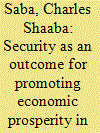| Srl | Item |
| 1 |
ID:
176796


|
|
|
|
|
| Summary/Abstract |
This study investigated the efficiency of the oil refining industry using the two-stage method of Markowitz portfolio optimization theory and panel data analysis of about 30 OECD countries from 2005 to 2016, which is a new methodology for measuring the efficiency of the oil industry. The oil refining industry's efficiency is derived from the prices of petroleum products (Naphtha, Gasoline, Kerosene, Diesel, and Fuel Oil) using the portfolio theory. The panel data was constructed using the following dependent variables, the crude oil production efficiency, energy consumption, renewable energy consumption, and R&D investment. Using the panel data analysis, empirical analyzes are conducted on how the efficiency of the oil refining industry is affected by explanatory variables. The results show that crude oil production and energy use in OECD countries have a negative effect on the efficiency of the oil refining industry, and consumption of renewable energy and R&D investment have a positive effect. Contrary to conventional perception, the petroleum industry can coexist with the renewable energy industry for sustainable development.
|
|
|
|
|
|
|
|
|
|
|
|
|
|
|
|
| 2 |
ID:
119265


|
|
|
|
|
| Publication |
2013.
|
| Summary/Abstract |
The literature in defence economics has tended to focus on the relationship between defence spending and economic growth. Studies examining the linkage between defence spending and government debt have been relatively rare. Given the recent Global Financial Crisis, originating in the developed economies, and the changed international security picture since 9/11, it is timely to reconsider the defence-debt nexus in the rich economies. This study pays particular attention to developing an empirical strategy which is both soundly based on economic theory concerning the evolution of public debt and which uses econometric methods that are welladapted to the dynamic aspects of the relationship. From the standpoint of economic theory, if a government seeks to minimize the distortionary costs of taxation, then taxation will follow a random walk. Unexpected shocks (war and recession) will cause debt. Other idiosyncratic national-level political considerations that affect the evolution of debt can be factored out by the use of a dynamic panel estimation method. Employing the Arellano-Bond dynamic panel model to the data available from members of the Organization for Economic Co-operation and Development and North Atlantic Treaty Organization over the periods 1988-2009 and 1999-2009, this study finds that the defence burden is a statistically significant and economically important determinant of public debt.
|
|
|
|
|
|
|
|
|
|
|
|
|
|
|
|
| 3 |
ID:
176655


|
|
|
|
|
| Summary/Abstract |
Over the last two decades, the European Union and its Member States have introduced policies aimed at improving energy efficiency. The Energy Service Directives (ESD) introduced the concept of measurement of energy savings attributed to policies. Two different and complementary methodologies for the evaluation of energy savings have been developed under the ESD: the bottom-up (BU) approach, based on a technical analysis of each measure, and the top-down (TD) approach, based on the analysis of how energy intensity changes over time. BU methods can hardly take into account policy-induced behavioural changes, whereas TD methods have difficulties in disentangling policy-induced savings from other savings. Econometric models have been proposed as a viable alternative to deal with both drawbacks. The purpose of this article is to present an econometric model aimed at estimating the energy savings induced by energy efficiency policies in the EU Member States in the period 1990–2013. We introduce an explicit measure of Energy Policy Intensity based on the MURE database, which is used as explanatory variable in a dynamic panel model for 29 European countries. Our results suggest that energy consumption in 2013 in Europe would have been about 12% higher in the absence of energy efficiency policies.
|
|
|
|
|
|
|
|
|
|
|
|
|
|
|
|
| 4 |
ID:
119267


|
|
|
|
|
| Publication |
2013.
|
| Summary/Abstract |
In a recent paper in this journal, Wijewerra and Webb study the connection between military spending and gross domestic product (GDP) in a group of five South Asian countries, finding a small but statistically significant positive relationship between military spending and GDP. This paper reviews their approach and proposes an alternative which tries to deal with the problems of omitted variables and variable construction. It finds, in contrast, that a higher share of military spending in GDP is associated with lower growth of GDP per capita.
|
|
|
|
|
|
|
|
|
|
|
|
|
|
|
|
| 5 |
ID:
177038


|
|
|
|
|
| Summary/Abstract |
This study investigates the impact of security outcomes on economic prosperity in Africa and its Regional Economic Communities (RECs) using a balanced panel data of 35 African countries and eight RECs for the period 1990–2015. Economic prosperity was measured with real GDP per capita as the proxy while security outcomes was computed from security effectiveness and legitimacy by using principal component analysis. This study employs a panel causality test and the Generalised Method of Moments (GMM) estimation techniques. The empirical results suggest that security outcomes promotes economic prosperity at the continental level and in six RECs. This implies that the security measures used in this study are important in providing an enabling environment for economic activities and opportunities despite the numerous security challenges facing the continent. Thus, an appropriate policy to improve and strengthen the security sector should be given priority in the RECS and across the entire continent.
|
|
|
|
|
|
|
|
|
|
|
|
|
|
|
|